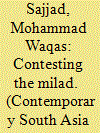| Srl | Item |
| 1 |
ID:
185589


|
|
|
|
|
| Summary/Abstract |
This article argues that in Pakistan, intra-Islamic differences and the contested field of Islamic identity politics affected and moulded the country’s integrated and overlapping religious identities into distinct and disparate categories at the micro level. The article discusses the process of formation of the jamaat of the Sufi-inspired silsila, the Naqshbandia Awaisia, by Major Ghulam Muhammad among the military and an urban middle-class constituency. It shows how the jamaat conceptualised and imbued Sufism with an exclusivist approach, positioning Sufism and Sharia within an Islamic discourse that categorically rejected the religion’s ritual and devotional aspects. This embroiled these mutually constitutive and intersecting dimensions, Sharia, esoteric Sufi doctrine and the devotional and ritual aspects in an ambivalent relationship. The exclusion of the devotional and ritual aspects became a boundary-setting label of difference between the ‘proper’ Muslim and the ‘other’ along a matrix of knowledge and power.
|
|
|
|
|
|
|
|
|
|
|
|
|
|
|
|
| 2 |
ID:
190940


|
|
|
|
|
| Summary/Abstract |
This article examines Deobandi and Barelvi discourses on the milād, the celebration of the Prophet Muhammad’s birthday, an important marker of Barelvi identity and a primary site of contestation. It argues that milād indicates a significant development in the discourses of conflict between the ‘ulamā (religious scholars) of the two traditions as they have moved from subtle debates into categorically oppositional ones in Pakistan. This includes diverging from the opinions of ‘ulamā of the past, given the present competitive context. The milād is a site, event, and ritual in which both groups of ‘ulamā situate themselves as orthodox lovers of the Prophet, and the other as disrespectful or bidatī, bringing innovations into Islam. This also shows Islam as a discursive tradition, as both the conflict on and the practices of milād find historical precedents to justify positions in the present, while demonstrating changes in emphasis, contestations, and perceptions of self and other over time. As a result, when the Deobandi and Barelvi traditions have come to oppose and embrace the milād, in almost absolute terms in Pakistan today, they are also demonstrating subtle but significant developments in South Asian Islam over the past century.
|
|
|
|
|
|
|
|
|
|
|
|
|
|
|
|